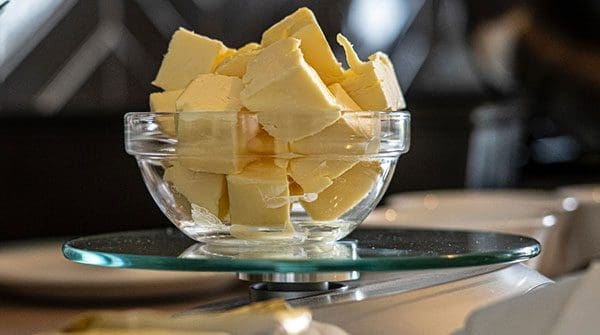Palm oil supplements are added to cow feed to increase the fat content in the milk used to produce butter
 I am not a baker and don’t want to be one, but have you noticed that the butter you leave on your counter isn’t as soft as it used to be? I always presumed it had to do with ambient temperatures in the house, but that’s not the case. It has something to do with the pandemic, palm oil, cow feed and saturated fat substitutions.
I am not a baker and don’t want to be one, but have you noticed that the butter you leave on your counter isn’t as soft as it used to be? I always presumed it had to do with ambient temperatures in the house, but that’s not the case. It has something to do with the pandemic, palm oil, cow feed and saturated fat substitutions.
Read on to see what I’m talking about.
Studies out of the University of Guelph in Ontario are focussed on confirming if butter has changed, why this is happening and if it’s a good thing or not. Typically our butter is made from cow’s milk, which contains saturated fatty acids. Canadian regulations require that butter contain at least 80 per cent butter fat (also known as milk fat).
To meet this requirement, you need a specific type of feed that can help produce the desired output. That means farmers generally have to add supplements to the feed, primarily produced abroad. Now toss in the fact that butter usage increased by 12.4 per cent in 2020 – as a direct result of the increased interest in baking during the pandemic – and the decline in the number of milking cows in Canada due to reduced demand for milk, and you find that enhanced animal feed supplements needed to be introduced to meet the high demand for butter.
Okay, so how does palm oil factor in?
Well, it turns out that palm oil yields high volumes of fats. Palm oil trees produce two useful products – palm oil from the palm fruit and palm kernel oil from its seed. To supplement the feed that our cows get and to increase milk fat content and production from each cow, farmers often choose supplements that contain cheap and readily available palm oil derivatives. But in so doing, some of the characteristics of the palm oil derivatives, such as palmitic acid, come through. Thirty-two per cent of the palmitic acid may persist in the milk’s fatty acid composition, which tends to alter the saturated fatty acid profiles in the resulting milk. This produces butter with a different texture that no longer readily melts at room temperature.
Palm-kernel oil contains about 82 per cent saturated fats, which may have a darker side. Palmitic oil naturally occurs in lower concentrations in milk, meat, cheese and butter. However, higher doses of palmitic acid from palm oil sources may negatively influence our coronary health, according to the World Health Organization.
In the recent past, we shied away from almost all types of fats, but now nutritionists are indicating that some fats are good, so the global demand is rising. So we go full circle – we need to produce more fat from fewer cows and hence the influx of palm oil-based feed supplements to meet the demand. It is reported that 50 to 90 per cent of Canadian farmers now use some form of palm oil supplement in their feed.
Unfortunately, these aren’t just any old palms – they are a specific type that grows in tropical regions. The result is vast swaths of tropical rainforests, particularly in Indonesia and Malaysia, being cut down to allow massive palm oil plantations to prosper. This, in turn, leads to the demise of many species of animals (e.g. Sumatran Rhinos and Orangutans) as this monoculture is unsuitable habitat for most tropical rainforest species.
Now is there a good side to palm oil? I hate to admit it, but maybe: if we don’t use palm oil or another option isn’t readily available, we need more cows to produce more milk. Cows poop and produce methane gas, which negatively impacts the climate.
One solution is to use other protein sources such as soybeans, flax, canola or sunflower oils. But even these have their pros and cons. Paraguay is currently under siege from huge soybean farms, with its Atlantic forest in peril as a result! Time will tell if these offset the demands and solve the problem.
Gotta run now – I have to go melt some butter!
Geoff Carpentier is a published author, expedition guide and environmental consultant.
For interview requests, click here.
The opinions expressed by our columnists and contributors are theirs alone and do not inherently or expressly reflect the views of our publication.
© Troy Media
Troy Media is an editorial content provider to media outlets and its own hosted community news outlets across Canada.


